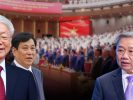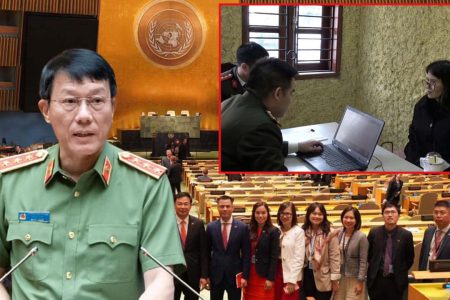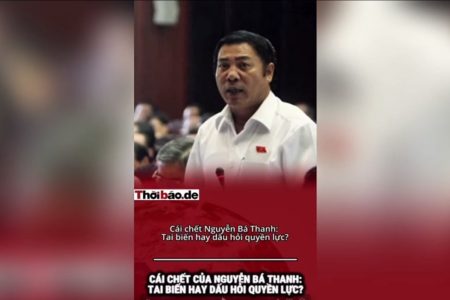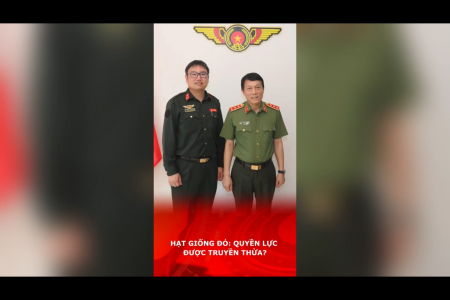
Vietnam and great powers
Vietnam is emerging as a focal point in regional diplomacy. The great powers are trying to „entice“ Vietnam. But whose side Vietnam will lean toward is the key question.
On July 5-6, Russian Foreign Minister Lavrov visited Hanoi before going to Indonesia to attend the G20 Summit.
Although Mr. Lavrov affirmed that his trip to Hanoi this time was very normal, it is clear that in the context of the entire Western world that is punishing and embargoing Russia, his visit to Vietnam this time has many intentions, including involving Vietnam in the Ukraine issue.
The Russian press has clearly expressed the view: „Currently, the US and the West are aggressively enticing allies in the Asia-Pacific region with the establishment of the AUKUS military bloc and the restoration of the ‘Quad’ group. These organizations, while short-term used to contain China, clearly affect Russia in the long term. While the US and its allies Japan and South Korea use many cards to entice Vietnam to participate. Therefore, Vietnam also needs further security guarantees from Russia to be able to maintain its neutrality.”
Mr. Lavrov also praised Hanoi: „Russia appreciates Vietnam’s stance when it refuses to join the anti-Russian sanctions. This shows Vietnam’s desire to develop comprehensive cooperation with the Russian Federation in both bilateral and international terms. According to analysts, Russia shows respect for Vietnam’s stance and still wants Vietnam to be Russia’s ‘stable fulcrum’ in Southeast Asia as well as the Asia-Pacific.”
Enhance relations with Russia
During talks with Mr. Lavrov, Vietnamese Foreign Minister Bui Thanh Son emphasized that developing relations with Russia is Vietnam’s top priority.
Mr. Nguyen Minh Hoang, an expert on Vietnam-Russia relations, said: „Minister Bui Thanh Son’s speech is of great significance, especially in the context that Russia is under strong pressure. On the one hand, this is an affirmation of the priority and importance of Vietnam-Russia relations; on the other hand, this emphasis also affirms a very high degree of political trust between two states, two peoples under any circumstances. In international relations, political trust occupies a particularly important place.”
Perhaps to prove this point, both the Prime Minister and General Secretary of the Communist Party of Vietnam had a meeting with Mr. Lavrov when he was only the Foreign Minister of Russia, while Mr. Trong had previously refused to meet US Vice President Kamala Harris when she visited Vietnam last year.
The Russian side said that during the joint press conference (Although the Vietnamese press did not show this content), Mr. Lavrov said: „We have identified the challenges of the Western countries led by the United States of America. creating for the global economy. We have a good understanding of how to advance our trade and economic and investment relationships in these circumstances to ensure them against the impact of illegal unilateral sanctions imposed by the United States, the EU, and its allies impose in that area.”
We should know, that before that, US Secretary of State Blinken was scheduled to visit Vietnam on July 9-10, after attending the G20 Summit, but this visit was postponed at the last minute. Therefore, this statement of Mr. Lavrov, but in a joint press conference with Mr. Bui Thanh Son, will be like an affirmation of the „position“ of the Vietnamese side, even though Vietnam always insists that it holds its neutral position.
Always looking to China?
On July 4, Chinese Foreign Minister Wang Yi also had a meeting with Vietnamese Foreign Minister Bui Thanh Son on the sidelines of the 7th Mekong-Lancang Foreign Ministers Meeting in Bagan (Myanmar).
The meeting between the foreign ministers of the two countries took place in the context of Beijing facing increased pressure from the US. Last week, China was named a „systemic challenge to Euro-Atlantic security“ in the strategic concept of the North Atlantic Treaty Organization (NATO). The United States has previously vowed to work with allies in the region to combat illegal fishing and strengthen their defenses to counterbalance China.
Mr. Wang said „Currently, the world situation is changing like never before and evolving rapidly, making global challenges constantly appear. As friendly socialist neighbors, and important forces in emerging markets, and developing countries, China and Vietnam have deep common strategic interests. The two sides need to maintain strategic communication, deepen the strategic cooperation relationship, strive to build a community of common destiny, and work together on the new path of developing a suitable socialist cause condition for each country to make greater contributions to peace and prosperity of the region and the world.”
Mr. Bui Thanh Son affirmed that „The Party and the State of Vietnam always attach great importance to friendship and cooperation with China and wishes to promote the relationship between the two parties and countries to develop in a healthy, sustainable and long-term, daily basis. political credibility and efficiency cooperation.“
Thus, it is enough to see that the trip to visit five Southeast Asian countries (excluding Vietnam) but Mr. Wang and Beijing still feel secure when Vietnam is always within its „circle.”
Who is bringing more trade benefits to Vietnam?
In the relationship with the US, China, and Russia, we can see which side the claims of the Vietnamese side lean towards. But in trade, which side is bringing the most benefits to Vietnam?
Data on imports and export in the Vietnam-US trade relationship in 2021 shows that the bilateral trade hit $111 billion. Vietnam exported $96.29 billion and imported about $15.27 billion. Thus, in 2021, Vietnam had a surplus of $81.02 billion from the US market.
Meanwhile, what about trade between Vietnam and China? According to statistics of Vietnam Customs, in 2021, two-way trade turnover reached $165.8 billion, up 24.6% over the previous year. According to statistics from China Customs, two-way turnover reached $230.2 billion and Vietnam’s trade deficit with China was $54 billion.
As for the EU, in 2021 two-way trade between Vietnam and the EU rose 14.8% on year to $63.6 billion. Specifically, the total value of Vietnamese goods exported to the EU raised 14.2% to $45.8 billion while EU exports to Vietnam reached $17.9 billion, up 16.5% compared to 2020.
Thus, Vietnam exported goods worth about $144 billion to the US and the EU, accounting for more than 40% of Vietnam’s total export turnover ($336 billion), and three times larger than Vietnam’s export turnover to China. According to the Ministry of Industry and Trade, two-way trade between Vietnam and Russia in 2021 was $7.1 billion, accounting for just over 1% of Vietnam’s total import and export turnover and ranking 21st among the main trading partners of Russia. Which, Vietnam exported $4.9 billion, and imported about $2.2 billion.
Thus, Vietnam is reaping a lot of economic benefits from the US and EU, but Vietnam’s foreign priorities are always for Russia and China.
Thoibao.de (Translated)


























